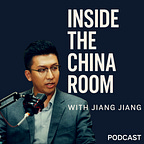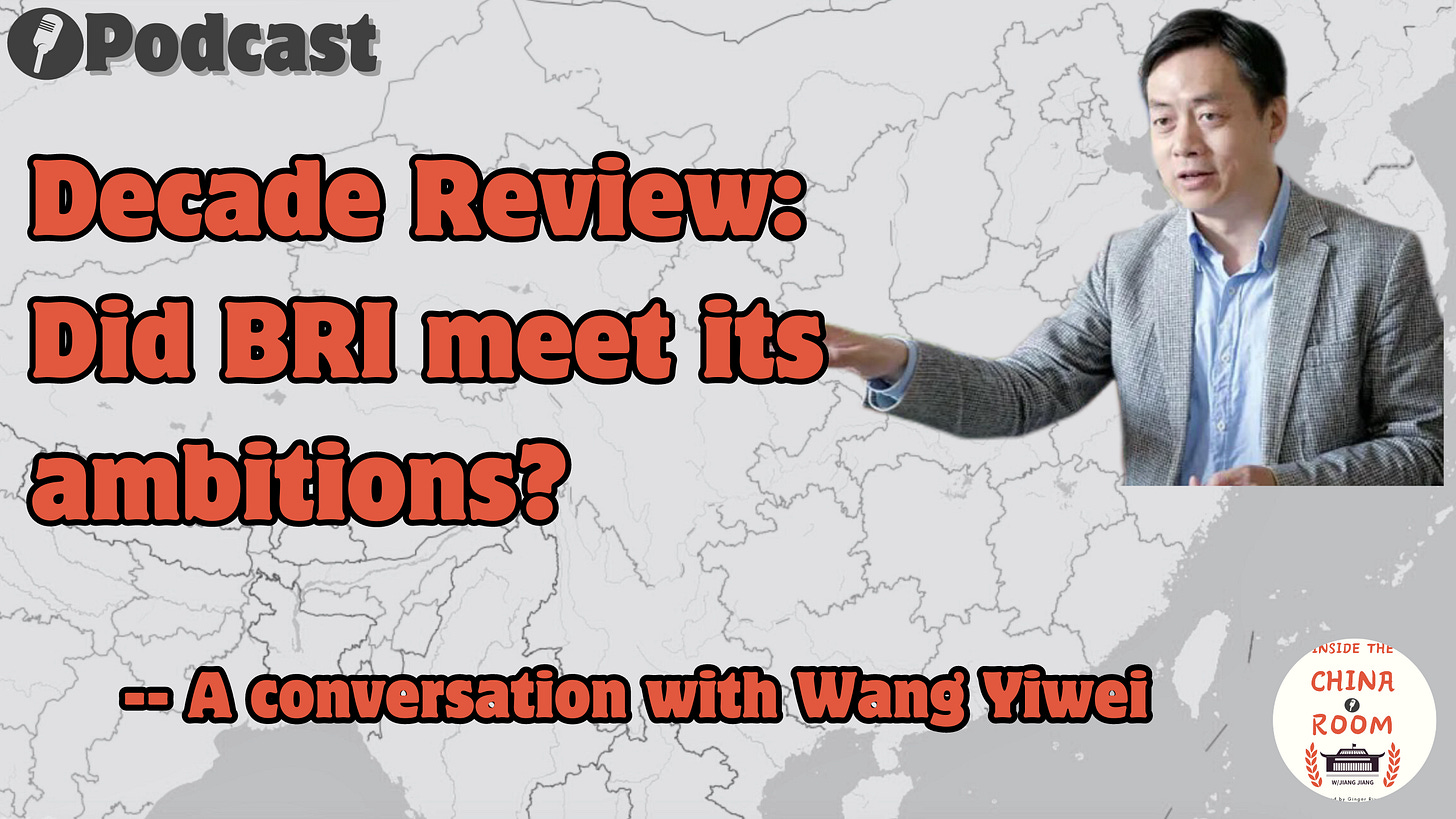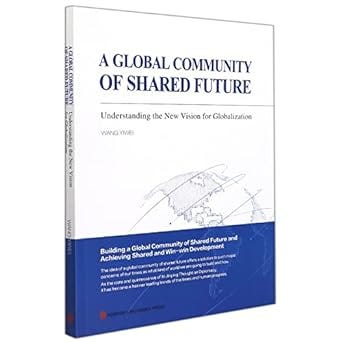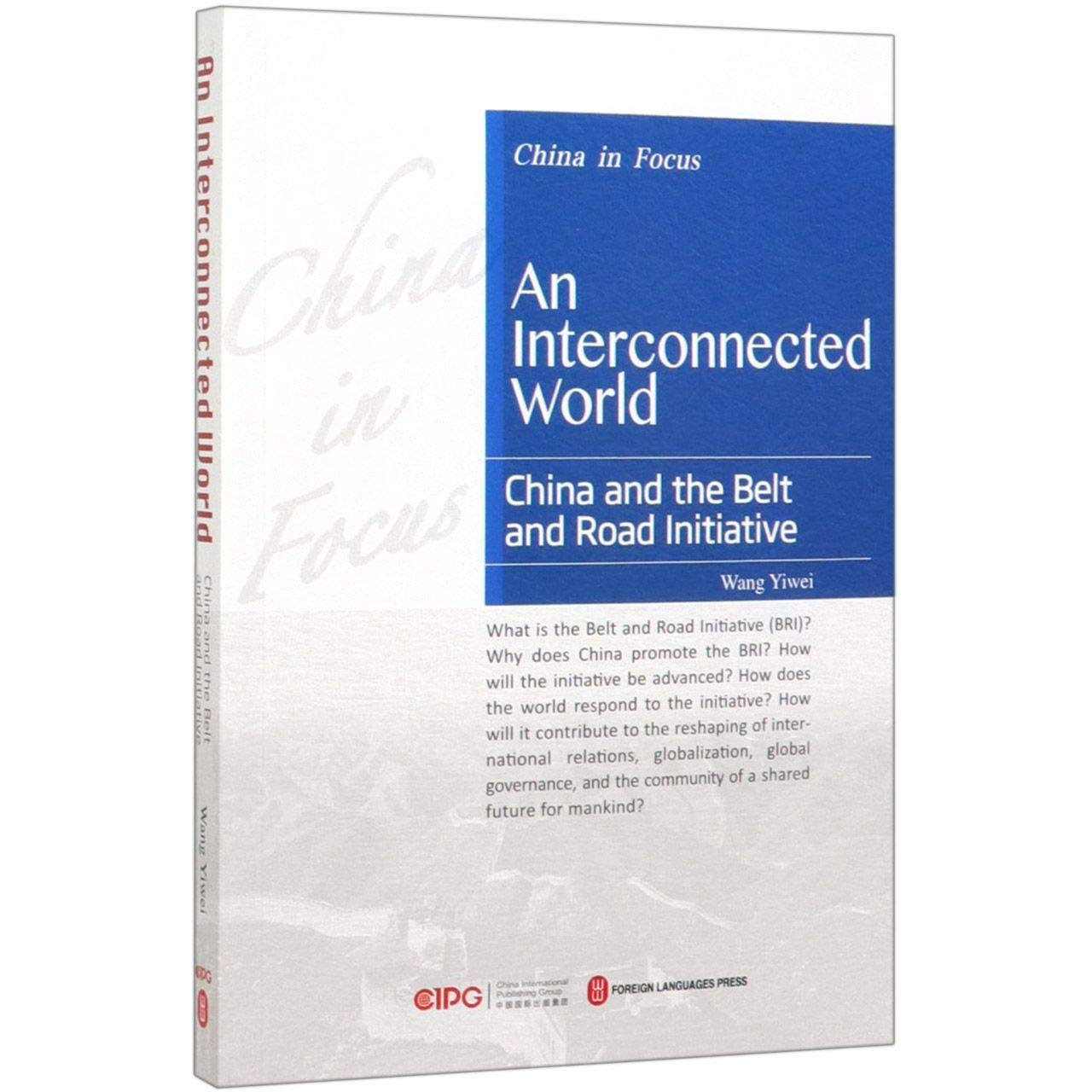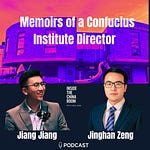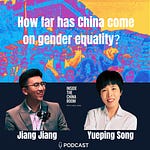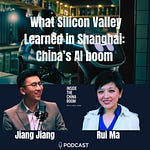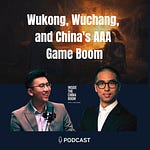This week on Ginger River Radio, Jiang Jiang (JJ) welcomes 王义桅 Wang Yiwei, who is Jean Monnet Chair professor, Director of the Institute of International Affairs, and Director of the Center for EU Studies at Renmin University of China.
With his academic interests spanning diverse realms, including Belt & Road studies, European integration, public diplomacy, Chinese foreign policy, and EU-China relations, Professor Wang is a trailblazer in his field. Notably, he has been a pioneer in advancing global commons theory, critiquing Western international relations theory. As one of China's earliest scholars in the domain of public diplomacy, he has consistently fostered academic connections between China and Europe.
In this episode, Professor Wang provides insights into various aspects of the Belt and Road Initiative (BRI), including its origin and three stages of development, and discusses whether the BRI represents a new form of colonialism or a debt trap. He also explores Italy's stance on the BRI, China's competitive advantages, its cooperative approach with non-participating nations, and the BRI's role in reshaping globalization. Finally, he shares expectations for the BRI's future and its potential benefits for China.
Summary:
The Belt and Road Initiative (BRI) has undergone three stages of development, initially focusing on hard infrastructure and subsequently advancing to soft infrastructure projects. The third stage will venture into more innovative projects such as digitalization and cultural exchange. The BRI is not a new colonialism or debt trap but a strategy to address colonialism's legacy, with its vision endorsed by UN. Italy's withdrawal from the BRI is influenced both by COVID-19 disruptions and pressure from the G7 nations to maintain global alliances.
China's advantage in advancing the BRI projects lies in its complete industry categories, ensuring efficiency, cost-effectiveness, long-term stability, inclusiveness, and adaptability to local conditions. The BRI's cooperative approach extends beyond its participants, with non-BRI countries like Brazil engaging in various projects. This initiative represents a new form of inclusive globalization, emphasizing people-centric and development-oriented approaches.
Expectations for the next ten years of the BRI involve forming multilateral alliances and headquarters, increasing influence, and expanding its scope. The BRI has facilitated convenience for the Chinese people and supported the growth of the Chinese economy while promoting global diplomatic outreach.
You can also listen to Ginger River Radio on Apple Podcasts and Spotify.
王义桅 Wang Yiwei, Jean Monnet Chair professor, Director of the Institute of International Affairs, and Director of the Center for EU Studies at Renmin University of China
Highlights:
05:56 - The origin of BRI
08:09 - Three stages of BRI
12:17 - Is BRI a new colonialism or debt trap?
15:15 - Why doesn't Italy want to continue with the BRI?
19:10 - Chinese competitive advantages
22:04 - China's cooperative approach with non-participants of BRI
25:18 - BRI as a new form of globalization
26:13 - Expectations for the BRI's next ten years
28:31 - How China can benefit from BRI
Recommendations:
Books - Professor Wang Yiwei's recent books include A Global Community of Shared Future: Understanding the New Vision for Globalization, An Interconnected World: China and the Belt and Road Initiative, China Connects the World: What’s Behind the Belt & Road Initiative, The Belt & Road Initiative: What China Will Offer the World in Its Rise, Haishang: Revelations of European Civilisation and China NATO Research Series (Chinese Edition).
A Global Community of Shared Future: Understanding the New Vision for Globalization
An Interconnected World: China and the Belt and Road Initiative
A complete transcript of this podcast is available here:
JJ: Welcome to the Ginger River Radio podcast, a part of the GRR media outlet and your go-to podcast for anything about Chinese current events. I'm your host, Jiang Jiang, the founder of Ginger River Review (GRR), a newsletter that focuses on reporting the priorities of both the leadership and the general public in China and views you do not normally see from mainstream English language media. If you haven't subscribed to our newsletter, go to www.gingerriver.com and sign up to join our community of avid China-watchers. Now let's dive into our podcast show today.
Hello, folks! Ginger River Radio is back! I've missed connecting with you over the past couple of months due to some personal matters. As some of you might be aware, I took up a position at my agency's Islamabad office in Pakistan starting April of last year. Now that my tenure there is complete and I'm now back in China. It's been quite a year, and I am looking forward to sharing my experience there with you in the near future.
Today's podcast will be somewhat related to my time in Pakistan, as I will be discussing the Belt and Road Initiative (BRI) with a prominent Chinese expert in this field. Given that the China-Pakistan Economic Corridor is a flagship project of the BRI, I'll be drawing upon my personal insight throughout the show. This year marks the 10th anniversary of the BRI, and Beijing will be hosting the 3rd Belt and Road Forum on October 17th and 18th. So, there's a lot to talk about!
Joining me to discuss the current challenges and opportunities faced by the BRI is Wang Yiwei, who is a Jean Monnet Chair professor, Director of the Institute of International Affairs, and Director of the Center for EU Studies at Renmin University of China. He is a leading researcher on the Belt and Road Initiative and the editor of the ten-volume China NATO Studies Series. Professor Wang did this podcast show with me online when he was traveling from Kazakhstan to Uzbekistan, two member countries of the BRI.
JJ: Hi, Professor Wang, welcome to Ginger River Radio.
Wang: Thank you for the invitation.
JJ: I'm really happy to have you here today, and I know that you are actually traveling overseas. Could you first share with our listeners a little bit more about your personal history with "Belt and Road Initiative", and the kind of work you're doing with BRI right now?
Wang: Well, I'm currently visiting Kazakhstan. This is the birth place of the Silk Road Economic Belt. Now I am flying to Uzbekistan. It is also another very ancient silk road country. And then to Indonesia, which is also a country along the 21st Maritime Silk Road put forward ten years ago. This is a trip organized in celebration of the ten-year anniversary of the BRI. And also prepare for the third forum for international cooperation next week in Beijing.
So for BRI, I "grew up" with BRI, because I moved from Shanghai to Beijing in 2012 after three years working as a diplomat in the Chinese mission to the EU. Actually, before that I was professor of the Center for American Studies and Fudan University.
After Brussels, my diplomat career, I shifted to the European Studies. So now finally got Jean Monnet Chair professor. And then, when I moved to Beijing, and then the new era began. President Xi put forward the "Belt and Road Initiative".
There's a saying, when I was interviewed by Guangming Daily, it seems like I'm ready for BRI. Because my former background is in environment engineering, and I worked in Tianjin for two years.
My major was natural science engineering and I've worked in the factory, and then worked as a diplomat, and then worked on American studies and European studies. And then international religion theory and the diplomatic service, so all these actually serve the BRI, because the BRI is not one single subject or discipine. It's not just about trade. It's not just about geopolitics. It's not just about culture. It's everything. It's very inclusive. So my background is very good for this actually, so I know this is a new era. Not just for China, but for the world.
I was the post doctor of history studies at Fudan University, so I know the history of Eurasia, of world history. I know the China's recent generation of the Chinese nation.
Actually this traces back to the silk road, and even the globalization history also traces back to the silk road. Over 500 years ago, when the ancient maritime silk road was suspended by the Ottoman Turkey who occupied Istanbul and then expanded to Europe. And then the Europeans had to seek help from their religions against the violence of Muslim, and also they bought many silk and many resources from Asia. So they went to Asia by sea, and then the destiny of the world changed. So it's a maritime globalization. But actually, the development gap was very huge. Coastal areas are advanced, but landlocked areas are relatively poor, including areas in China.
So, that is the reason why ten years ago President Xi put forward the Silk Road Economic Belt in Kasakistan, which is the largest landlocked country in the world. And then China-Pakistan Economic Corridor is a pioneer project. Because it connects the Belt and the Road, land and sea.
So that's basically the philosophy of the initiative.
JJ: Yeah, Professor Wang. It's great to know that you have a diversified background. I certainly agree with that, because I have also been in Pakistan for over one year, and I covered the Belt and Road Initiative and the CPEC, the China-Pakistan Economic Corridor. It's a flag project of the Belt and Road Initiative, and you also mentioned the gap you saw overseas and the reasons why china put forward such an initiative. We know that this year is the 10th anniversary of the BRI, could you summarize how do you see the different development stages of BRI over the one decade, and what are the distinctive characteristics and accomplishments of each phase. Where are we now in this progression?
Wang: Well, I think maybe there are three stages of the BRI in the past ten years. The first stage, of course, it's about hard infrastructure building. Those countries want to learn and share China's opening and reform experience, that is, one can get rich by building the roads. But under the new liberalization and globalization, you don't have money, and you don't have technology and expertise and engineering to build the roads. How can you get rich by building the roads? How can you get common wealth by building the roads.
Twelve years ago, China overtook United States as the number one industrial power. China has the most complete categories of industries, according to UN system. So far, china's industrial power, its value, now is the G7 countries combined together. So that's a reason China can provide public goods from infrastructure building and on the basis of infrastructure, clusters of industries and economic zones, and then economic corridors, and then economic prosperity, common prosperity and mutual connectivity within country and between different regions. So that's the first stage. During that time, China had comparative advantage. We had $4.2 trillion foreign reserves and the so-called overcapacity problem for China after the global financial crisis.
Forty years ago, China's opening and reform put US and Europe as major markets. One fourth of the goods made in China went to the US market, another one fourth went to the European market. But after a global financial crisis and debt crisis of Europe, they cannot buy so many goods from China, so the overcapacity problem came. That's the first stage. It is about hard infrastructure building. It's about building ports, airports and railways for connectivity.
The second stage is more about high quality, softer infrastructure building. That means you need to have the standards, rules, systems, regimes and mutual connectivity. So that's soft infrastructure building being highlighted. And there are not just hard projects. There were the so-called "small and beautiful projects" involved "菌草", the herbs like mushroom. Now it's cultivated in over one hundred countries, like Fiji, Rwanda and many other countries. So it's easy to benefit the local people, easy to learn by doing. And also good for environment protection and tax income. So that's the second stage.
The third stage, I think, after the third forum. Maybe it's more focused on "心联通,硬联通,软联通" (People-to-people connectivity, hard connectivity and soft connectivity)
Wang: Yeah, it means more new areas, like digitalization to Green Silk Road, and then culture. Culture is now in china related to everything we talk about, like AI, virtual reality and all these. So make people understand each other, and the digital currencies and their innovation, cultural innovation. All of these contribute to the Belt and Road Initiative and mutual connectivity through the hard and soft even the "heart" mutual connectivity, so that's basically the three stages.
JJ: Yeah, i'm glad you mentioned about this when you're talking about the third stage you mentioned that BRI is not just about the economy, is also about the culture. Some overseas Chinese watchers call the BRI a new colonialism. Do you think it is a fair judgment to the cultural influence part of the BRI?
Wang: Ok, If BRI is a new colonialism, why 152 countries volunteered to sign MOU to jointly built BRI?
JJ: Yeah.
Wang: And particularly, for all the countries that signed, African countries suffer from colonialism, both the old one and the new one. But now they think BRI is their hope to get rid of poverty. Why? At least five times, the United Nations resolutions also endorse BRI, and particularly the UNDP puts BRI as synergy with the SDGs, like getting rid of poverty, empowering people, environmental protection and so on.
Even about the so-called debt trap. There's debt. But there's no trap. No one is forced to join the BRI. They can volunteer to leave and volunteer to join, like Italy. It's fine.
It's not new colonialism, but it's to deal with the colonialism legacy. For instance, in Africa, 24 Franco countries were colonized by France before. Two neighbors don't have direct flights. If you want to reach your neighbor's capital, you need to fly to Paris and then change the flight.
So that's really a very cold periphery system, an unfair system. Even they're independent, but economically, they're not independent. So now they learn and share their modernization experience to decolonize Africa. So that's a reason for the slogan of the synergies of strategies with the African Union, (for) 2063, (which) will mark the 100th anniversary of the African Union. The slogan is "Made in Africa, with China, for the world." So, how does Africa become a small world factory, or regional world factory, like Ethiopia, their eastern industrial park. So it's a decolonization experience and process of the BRI.
JJ: Yeah, and you mentioned there are over one hundred countries signing agreements with China, on cooperation on the BRI, including some European countries. But Italy, the only G7 country to have joined the initiative is likely not to renew its commitment this year. They believe that maybe their participation hasn't yielded their expected developmental and economic benefits.
What do you think of this? How do you view their stance? What challenges and impacts might Italy's withdrawal present for the initiative implementation?
Wang: Well, as I mentioned, the Belt and Road Initiative embraces openness and inclusiveness. You are voluntary to join. You are voluntary to leave. No one forces you to do that. Why doesn't Italy want to continue with the BRI? It's complex.
They doesn't get enough benefit from the BRI. Of course, they got benefits. Why are the benefits not enough? Of course, the first reason is the 3-year COVID.
China suffered a lot. Italy also suffered at the beginning of it, very seriously. So many projects cannot reach their original goal. That's very important, actually. But, Italy, because it's a G7 country. Next year it will take the presidency of the G7. So the US and European countries, particularly US now asks Italy to withdraw, otherwise it should take sides between the BRI and the G7, which makes this a zero-sum game. Actually, Italy's current government will agree with America. And after the Ukraine crisis, after Brexit, Italy's influence has increased in the European Union. Actually, Italy benefited from the BRI, not just from the trade and investment from China. But also, as a BRI country, Italy is a guest country of honor in the China International Import Expo in Shanghai and also the Expo in Hainan. Also, Italy companies joined the C919, a aircraft project.
JJ: Yeah.
Wang: And LNG and other many projects. Italy can jointly set the rules and standards with other partners. So, Italy benefits a lot. But the current Italy government focuses only on trade, on investment and some particular areas. They say these areas don't benefit enough.
So this is unfair.
JJ: I see, since your answer just touched that. I'm going to ask this question. So actually, at the recent G20 summit, the Biden administration proposed a new idea, forming a trade corridor between India, Europe and the Middle East, in collaboration with 32 countries, including some other EU members.
Some analyses see this as a challenge to the BRI. Additionally, the EU has also proposed a € 300 billion global gateway plan to enhance infrastructure in emerging industrial and developing nations, which, some believe, aims to counterbalance the influence of the BRI. Do you think these plans are comparable to the BRI, and will they compete, or even have some significant clashes with each other? Or can we complement each other or cooperate with one another?
Wang: China welcomes all these projects and initiatives. We asked all the countries, particularly the major countries and economies to focus on the real economy, not just make bubbles like US previously printing US dollars. But it's not the first time. This is the third time. The US has the beginnings of the Building Back Better.
Second, for today, the Europe-Central Asia or India-Middle East corridor, so many sub corridors and BRI projects. European Union also holds the Global Gateway strategy. And China says, because the principle of the BRI is inclusiveness, synergies of the strategies. So we are ready. We welcome all of these projects, we are ready to cooperate with them even compete with them.
Chinese competitive advantage is that we have the most complete industry categories in the world. So everything made in China, built by China or with China is the most efficient, the cost is the lowest. So we are very self-confident about all that.
In China, we can have designs for decades. We have five-year plans, five-year plans for four decades. But for other countries, for example, next year, can Biden be the president or not? We don't know. And Italy, the climate changes too frequently in Italy. For European Union, next year, there will also be an election. So those countries, they are waiting to see. And think about China, everything that China made a promise, everything China designed and then they joined it. Firstly, they can have long-term stability. Secondly, they are inclusive. Thirdly, they adapt to local conditions, but not interfere with domestic affairs, not put a so-called high, too high standard like private capital given or green, anything, but not much the local conditions.
So we are self-confident, we are ready to compete, cooperate with every project and initiative.
JJ: Mr. Wang, since you are traveling along the countries that have participated in the BRI. Could you share with us some of the things that you see or you expect to see, which impressed you, or some of the things that you expect to see on your next trips?
Wang: The most impressive thing for me is when I visited so many countries, they cannot have clean water to drink. They don't have...
JJ: Yeah. I've also seen that in some places in Pakistan.
Wang: They even live in darkness. Even though they have electricity, it's too expensive. They can't afford it.
JJ: And the electricity may not be stable enough.
Wang: Yes. So those countries have been independent for so many years, but they don't have basic living standards.
We say, this is globalization, this is a global village, this is modernization, everything. But those countries still live in darkness. More than 1 billion people still live without electricity. 2.7 billion people without access to the Internet. So when we talk about digital, AI, everything, they still live in darkness without electricity, without the Internet. How can we say this is a community of shared future?
JJ: Actually China is emphasizing the importance of the BRI, and its international economic collaborations with the majority of participating nations. But some concerns suggest that this might weaken China's engagement with the non-participant countries. So what kind of cooperative approach will China adopt with nations that have not been involved in the Initiative?
Wang: I just give one example, Brazil. So far, it has not signed MOU with China or the BRI. So it's not considered as one of the BRI countries. But Brazil has so many projects from China or with China, for instance, electricity and also hydro projects, and also the new technology and new energy. So, though it didn't sign (the MOU), we understand that because Brazil is a big power, and they should pay attention to the relations with the United States. But we're patient. We're doing, and they're doing.
So it's not that because you sign the BRI, then there is discrimination to other countries not signing, but that when you sign the MOU, of course, it becomes a long-term guarantee for the investment and stable relations, and also allows you to jointly set certain rules and standards with other partners of BRI, towards globalization, more inclusiveness, more balance, more justice, more win-win, more sustainable.
Yes. When you join earlier, you benefit earlier.
Another example is Kenya. We built the Mombasa-Nairobi Railway. Now this does not just contribute 2 percent of the economic growth for Kenya, but also benefits five other Eastern African countries that need to use this railway to access the ocean. And then Kenya, the leading country in eastern Africa, even in Africa. It also stimulates Namibia, and many others. African countries say, this is like the Yangtze River Economic Delta, compared to China, in Africa. We also have the Pearl River Delta Economic Zone.
So when I was Namibia, Kenya's slogan is joint prosperity. So it's like the opening and reform, when you start this first, and then you will be benefited, if you believe, you can achieve.
JJ: Yeah, and we know that some people now say that there is a trend of de-globalization. And I saw your interview published by a media yesterday. You mentioned that, actually, the BRI represents a new form of globalization, or it changes the old form of globalization, which relies on trade overseas, from the sea to the land. Can you elaborate this idea for us?
Wang: Firstly, globalization is not a private gift to any other country. Even though the US launched so-called neo-liberalism globalization in the name of the Washington Consensus, now the market declares this kind of globalization is dead.
A new kind of globalization now is coming to force. I think that BRI is that kind of new, inclusive globalization, which changes the past so-called capital-driven nature. But now, (globalization becomes) more people-centric, it is more development-oriented. Now, the third BRI Forum may be more focused on rule-based development, based on the current 10-year development. So it has more inclusiveness, more focus on the real economy. It's more people-centric and more focused on sustainable development.
JJ: Over 10 years, is there anything that remains to be achieved by the BRI? And what is your expectation or what will be the future direction of BRI?
Wang: So far, 152 countries plus 32 international organizations signed MOU with China, but these are bilateral. So we need, maybe, multilateral allies of this region. And so far, this is just an initiative without Secretary General, without headquarters or any other, like the BRICS. Maybe in the future, BRI, with its goal to build the community of shared future, will be more institutionalized. And then, I think it will have more influence in the future.
JJ: And will the scope of the BRI continue to expand?
Wang: Of course, so far, I think the majority of the members of UN, three fourths of the countries have joined BRI. Some countries want to join, but they're afraid of the US, or India –– the regional or global hegemony, so they're not allowed to join, but actually, they want to join. And some countries have their own ambitions, as I mentioned about Brazil. Maybe next year, President Xi will visit Brazil to celebrate the fifty-year anniversary diplomatic ties. There will also be a BRICS summit. I think Brazil will also join next year.
JJ: In your previous interview, you mentioned Chinese unique strengths in BRI, particularly its institutional and industrial systems. I think today we've talked a lot about the benefits of BRI brought to the other countries, but for China, you mentioned that for the next stage, for the third stage, it might be more related to industrial, especially the digital part. And we know that China is also upgrading its own industrial sector. So how do you think that China can benefit from BRI? And how will China be able to leverage its advantages on the international stage?
Wang: The Chinese people, the Chinese economy, and the Chinese diplomacy benefited a lot from the BRI.
Firstly, the Chinese people. Now I'm in Astana. I visited Astana seven years ago. When I applied for visa, it was very difficult, it took a long time. But this time, free, no need for a visa. Can you imagine? It's very convenient for the Chinese people to visit BRI countries. And even in Beijing Capital Airport, there is the channel particularly for BRI, before there was an APEC (channel). So it's more convenient for the people, for tourists, people exchange and also food. Now in a Chinese supermarket, you can buy so many products, agricultural products, particularly, from Chile, from Argentina, from Uruguay, so far away.
So, Chinese people benefit from the BRI. But they don't know these are BRI products or results, because they didn't mention about the BRI in the supermarket, it is only mentioned that this is made in Chile, this is made in Poland. But these are the BRI countries that we understand.
Secondly, Chinese economy benefits a lot, opening and reform in the past four decades is open, basically to Western countries. But now, the relations between China and Western countries, is economically competing with each other. So anti-dumping, anti-subsidy investigation, the so-called decouple, all these risks. Can you imagine? Without BRI and the new market, how can you make the Chinese economy double? How can you make sure China's middle class will double by 2035 on the basis of the current 400 million, and also per capita GDP of China can be doubled? Not just GDP, but GNP, as the overseas Chinese profits, national incomes will come from BRI countries.
So those countries, their relations with China isn't like the earliest stage of the Chinese relations with the Western countries. China's competitive advantage is that we are comprehensive.
Thirdly, for China's diplomacy, our relations with the BRI countries improved. For instance, East Timor is a new member of (BRI), it has not joined the ASEAN yet, it's a very young country, but its relations with China update to strategic partnership. Even Palestine also signed an MOU with BRI with China. Now they suffer from the conflict in Israel. Israel, also, definitely benefit from the Haifa port and subway, many projects. So our relations with those countries updated.
So, China's opening reform now it's an overall opening reform, not just a coastal area, and in Chinese, we say this is "陆海内外联动,东西双向互济" (GRR's Note: making new ground in opening China further through links running eastward and westward, across land and over sea), coastal areas and land-locked areas. And then East and West are both the new frontiers of the opening reform.
So, Chinese domestic market is more integrated, like the China-Europe Rail Express. For example, Chengdu has two international airports, one fourth of the China-Europe Rail Express start from Chengdu.
JJ: Yeah, thank you very much, Mr. Wang, we know that you're very busy and you're also traveling and I hope you have a smooth trip. And thank you very much for having a podcast show with me. Thank you!
Wang: Thank you and my pleasure.
JJ: The Ginger River Radio podcast is a part of the GRR media outlet. For cooperation, investing or feedback, email me directly at jjiang.sisu@hotmail.com, or just give us a rating and a review on Apple Podcasts. We would be delighted if you would recommend our podcast or newsletter to others if you find it helpful. Thank you for listening and see you next time. Take care.

